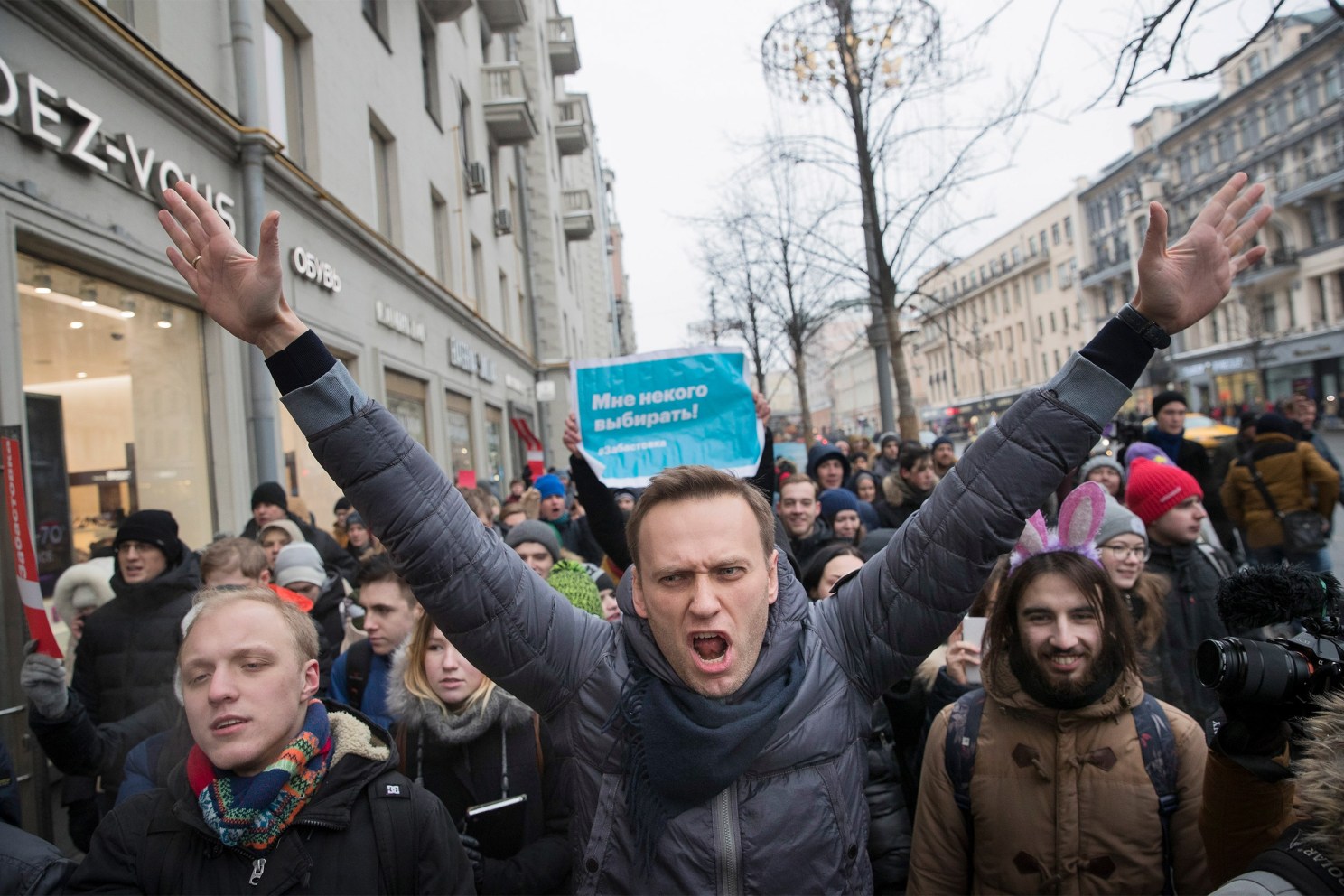What is Putin’s next move?

Alexei Navalny (center), who died in prison on Feb. 16, is pictured at a rally in Moscow, January 2018.
Evgeny Feldman/AP File Photo
Russian policy expert says death of opposition leader, Ukraine victories, political turmoil in U.S. bolstering leader’s confidence
The sudden death of popular opposition leader Alexei Navalny in an Arctic penal colony and a Russian advance in Ukraine last week have ratcheted up concern that an emboldened Vladimir Putin may be contemplating a new phase of global aggression.
At the time of his death, Navalny, 47, an anti-corruption activist and fierce Putin critic, was serving multiple sentences for charges his supporters claimed were trumped up. Western leaders were quick to blame Putin in the death of the Russian dissident, who had survived a near-fatal poisoning by a Russian nerve agent in 2020. Navalny’s aides said Thursday that Russian authorities have issued a death certificate saying he died of “natural causes.”
Navalny’s death comes as Russia scored a significant victory in Ukraine last week, taking the key city of Avdiivka, its biggest advance in eight months. News of the takeover arrived days short of the two-year anniversary of the Russian invasion. The Defense Department has reported that Ukrainian forces are running short of ammunition and supplies, with a $60 billion bipartisan aid package for Ukraine stalled in the House of Representatives.
The Gazette spoke with Alexandra Vacroux, Ph.D. ’05, executive director of the Davis Center for Russian and Eurasian Studies at Harvard, about Navalny’s death, the war in Ukraine, and what it signals for Putin and Russia’s political future. The interview has been edited for clarity and length.
Putin rarely acts without considering the symbolism or the ripple effect it could have. If he was involved in Navalny’s death, why might he have chosen to do it now?
We don’t know that Putin gave a direct order to kill Navalny on Feb. 16. We know that he did not want Navalny to be active on the political scene and that Navalny was put on ice — literally, in the Arctic Circle — in order to keep him from being involved in political campaigns. The presidential elections are March 17-19.
It would be surprising, not impossible, but surprising, that he would have wanted Navalny killed in the month before the election. It’s not a great look going into an election, and the Kremlin is trying to manage this as tightly as possible. So, I wouldn’t rule it out, but we don’t know that that’s the case.
Even if it turns out that he was murdered, with a nerve agent or something like that, we don’t know that was Putin’s decision and not, say, some lower-level actor who felt that he was doing Putin a favor.
Does Navalny’s death complicate next month’s election?
We don’t know. One of the things that Navalny had called for before his death was for people to go out on March 17, which is one of the voting days, at noon to show their displeasure with the fact that this is an authoritarian sham election. It remains to be seen if people do that.
If there are huge crowds that come out at noon and overwhelm the polling stations, that will be a sign that Navalny and his wife, [Yulia] Navalnaya, are going to have some power to disrupt politics inside of Russia [while] not even being there.
Some Putin observers see this incident as a sign that Putin feels confident about defeating Ukraine. Others say it shows Navalny still had a lot of power, even in prison, and that Putin saw him as a danger, especially given the dissatisfaction with the war inside Russia. What do you think?
Not everybody liked Navalny or wanted to vote for him. But I don’t think that killing your political opponents gets you any traction, especially with people who object to the way that Putin is fighting the war. The people who object to the war in general — they’re extremely upset that Navalny is dead. And the people who support the war don’t care whether he’s alive or he’s dead. So I don’t think those two things are necessarily related.
If the question is, does Putin think he’s winning? The answer is yes. He definitely thinks he’s winning the war, quite apart from Navalny. And that’s because there are some incremental advances on the front line, like the taking of Avdiivka. But mostly, it’s because the Americans aren’t able to pass the kind of aid package that Ukraine needs in order to be able to fight effectively.
“Not everybody liked Navalny or wanted to vote for him. But I don’t think that killing your political opponents gets you any traction, especially with people who object to the way that Putin is fighting the war.”

Alexandra Vacroux
Stephanie Mitchell/Harvard Staff Photographer
What happens now to the anticorruption movement and Putin resistance that Navalny led? Will his widow or someone else be able to step in and sustain it effectively?
They’re going to continue doing their work. There’s a possibility that she is going to be able to unite the opposition figures, most of whom are abroad, in a way that Navalny couldn’t do, because he had a somewhat abrasive personality, and she was kind of quiet.
She might be abrasive too, but it hasn’t been as visible. So, there is an opportunity here for the opposition to come together and overcome their personal antipathy or disagreements with each other. But the record of Russian opposition uniting for a good cause is not great.
Navalny was the only one who actually had a movement. Before it was banned, he had offices in different parts of the country, and he had an administration or infrastructure.
But there are other people, like Mikhail Khodorkovsky, who is very interested in opposing Putin from abroad. He is potentially another force. If he were to come together with Navalnaya, then they would be stronger. But the opposition has always had their own ideas about what should be done, and those disagreements have been such that they don’t tend to unite on a common front.
In the last week or so, a Russian military pilot who defected to Ukraine was assassinated in Spain; Putin has been disparaging Poland; and tensions between Russia and Norway over an island in the Arctic have ramped up. Are we potentially witnessing a new phase of Russian adventurism?
I think what we’re seeing is a more confident Russia. They’re in a much better position, at least in their minds, vis-a-vis the war now than they were a year ago. And so, I think what we’re seeing is renewed confidence that Russia is going to be able to get most of what it wants in Ukraine. And that that’s going to show the world that they have the power to get things they want, even when the rest of the world says they don’t.
The fact that they still have China on their side, and that the global South has largely been sitting out the conflict and not taking sides, leads Putin to believe that he could potentially, with China, be a counterweight to U.S. and Western influence.
Of course, the fact that it’s a presidential election year in the U.S., that Trump has said things that suggest that NATO could lose American support, also gives Putin a great deal of confidence that time is on his side, and if he just waits long enough, the U.S. is going to be so polarized that it can’t do anything internationally, and that opens the door for him to be more influential.
Is there a risk that Putin would move on Poland or another NATO country once Russia has a firm upper hand in Ukraine?
When the situation in Ukraine is stabilized militarily, and hopefully that’s with Russian forces leaving, it’s going to take years for the Russian military to recover from everything that they’ve lost in Ukraine before they start testing Article 5 of NATO. But the chance that they will test Article 5 and hope that NATO doesn’t respond and is therefore seen to be a complete sham — that is, I think, very likely within the next five years or so.
The Biden administration is expected to announce a new round of sanctions on Russia in response to Navalny’s death. You’ve said that sanctions don’t hobble Russia as much as we’d like because Russia is so adept at finding workarounds. Is there anything left the U.S. could do or sanction that would punish or deter Russia?
They sanctioned the people who work at the prison where Navalny was killed, for what that’s worth. It’s like five guys who probably don’t have assets abroad anyway. They could try to tighten the oil price cap, which did reduce some Russian profits on the sale of oil for a while, but the Russians found a way around it by using other ships and other insurers.
I think there’s a realization that over the long term, sanctions weaken the Russian economy, but they’re not going to stop behavior right away.
Apart from very strongly pushing back against Putin, and not having people like Trump come out and say “Do whatever you want” in NATO countries, there’s not that much that we can do except pass that aid package and get Ukraine the weapons. That is one thing Russia understands as being a sign that the U.S. is still going to continue supporting Ukraine. The more we’re [not] sending that signal, the more the Russians believe that they will win.




